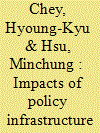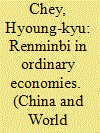| Srl | Item |
| 1 |
ID:
172647


|
|
|
|
|
| Summary/Abstract |
Despite burgeoning research on the internationalization of the Chinese renminbi, there has been surprisingly little systematic analysis of how the renminbi is actually used in foreign markets. This study provides a cross-country analysis of renminbi use in offshore foreign exchange markets, with special attention to the effects of the cooperative policy measures adopted by China and foreign states to promote the renminbi’s international use. We find that a country’s participation in the Renminbi Qualified Foreign Institutional Investor scheme (which expands its renminbi investment opportunities) and its establishment of an offshore renminbi clearing bank (which provides better renminbi payment services), but not its entry into a renminbi–local currency swap agreement, facilitate use of the renminbi in its foreign exchange markets. States have played a significant role in the rise of the renminbi as a newly internationalizing currency.
|
|
|
|
|
|
|
|
|
|
|
|
|
|
|
|
| 2 |
ID:
120402


|
|
|
|
|
| Publication |
2013.
|
| Summary/Abstract |
Chinese replacement of the U.S. dollar by the renminbi as the leading international currency appears unlikely, at least in the foreseeable future, owing to weakness in China's international political power and its economy, but the renminbi could develop into an Asian regional currency to some extent.
|
|
|
|
|
|
|
|
|
|
|
|
|
|
|
|
| 3 |
ID:
090935


|
|
|
|
|
| Publication |
2009.
|
| Summary/Abstract |
The Chinese Government has stepped up its drive to reconstruct its international financial strategy after the sub-prime crisis developed into a global financial crisis in 2008. The main aim of the strategy is to reduce the country's dependence on the US dollar in foreign trade, cross-border capital flows and foreign exchange reserve management. The strategy can be divided into three tiers: renminbi internationalization, regional monetary cooperation and reconstruction of the international monetary regime. So far, the Chinese Government has fared well in the application of all three tiers. We hold that the Chinese Government should continue in the same direction in a coordinated manner despite various challenges it faces.
|
|
|
|
|
|
|
|
|
|
|
|
|
|
|
|
| 4 |
ID:
141841


|
|
|
|
|
| Summary/Abstract |
For several years now, China has implemented policies to promote the international use of its national currency, the Renminbi (RMB). As part of these efforts, the People's Bank of China (PBC) has negotiated 25 bilateral currency swap agreements (BSAs) with foreign central banks. These make it easier for firms in both China and its partner countries to settle cross-border trade and direct investment in RMB. We seek to explain why China and these countries cooperate via BSAs. We theorize that trade and direct investment interdependence relate to dyadic BSA cooperation via two mechanisms: financing insulation from international liquidity shocks and reduced transaction costs of cross-border exchange for local firms. Additionally, we expect the presence of preferential trade agreements (PTAs) and bilateral investment treaties (BITs) will increase the probability of dyadic BSA cooperation. BSAs are natural extensions of these existing agreements. They represent an additional layer of state-level formal cooperation that further reduces barriers to cross-border trade and direct investment. Our empirical analysis finds that both de facto trade interdependence and de jure economic integration via PTAs and BITs increase the probability of BSA cooperation between China and partners.
|
|
|
|
|
|
|
|
|
|
|
|
|
|
|
|
| 5 |
ID:
138897


|
|
|
|
|
| Summary/Abstract |
Most studies of renminbi internationalization focus on the supply side, by examining China's own economic and political conditions. In contrast, this study addresses the demand side of renminbi internationalization, by providing an in-depth analysis of renminbi use in ordinary foreign economies from both economic and political perspectives, with a particular focus on South Korea, China's next-door neighbor. The study finds that sustainable indigenous market forces facilitating renminbi use in South Korea remain weak, despite the country's close economic ties with China. This research also shows, however, that the Korean Government has itself recently been able, through its policy measures, to generate new domestic support for greater use of the renminbi. These findings ultimately highlight the significant impact on the internationalization of a currency of the politics in the foreign countries using it.
|
|
|
|
|
|
|
|
|
|
|
|
|
|
|
|
| 6 |
ID:
120841


|
|
|
|
|
| Publication |
2013.
|
| Summary/Abstract |
The build-up of huge foreign exchange reserve makes China a net creditor and also brings in significant challenges to the Chinese economy. Considering the internationalization of the renminbi as China's response to the global imbalance, this paper analyzes the effect of renminbi internationalization on the formation of reserves and compares its benefits and costs in rebalancing China's external position with those of outward direct investment. It assesses the current progress in the practice of using the renminbi in cross-border trade settlement and in the development of the offshore renminbi market. It further examines the possibility of the renminbi serving as a global reserve currency in the future.
|
|
|
|
|
|
|
|
|
|
|
|
|
|
|
|
| 7 |
ID:
140231


|
|
|
|
|
| Summary/Abstract |
Where policy has substantially increased central bank assets, the corresponding liabilities present an opportunity to increase the breadth, depth and liquidity of the government bond market. In China's case, transformed illiquid central bank liabilities could double or triple the stock of government bonds. Central bank liabilities can be transformed into government bonds either through the government's purchase of foreign exchange reserves held by the central bank or by the government overfunding its borrowing requirement and depositing the proceeds in the central bank. The overfunding approach is preferred if, for financial stability reasons, it is judged prudent to leave the central bank with sufficient resources to serve itself as lender of last resort in foreign currency to the banking system. In the case of China, public debt consolidation could also contribute to further liberalizing the Chinese banking system, wider international use of the renminbi and more balanced holdings of key currency government bonds.
|
|
|
|
|
|
|
|
|
|
|
|
|
|
|
|